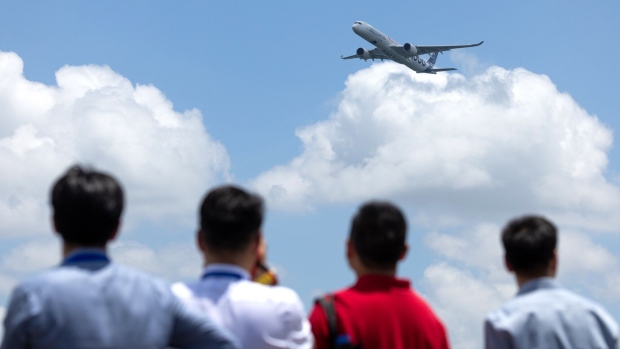Apr 25, 2024
Airbus Lifts A350 Rate, Highlighting Edge Over Boeing
, Bloomberg News

(Bloomberg) -- Airbus SE will further increase production of its advanced A350 widebody jet as the planemaker benefits from surging demand and as arch-rival Boeing Co. remains absorbed in a crisis of confidence.
The European planemaker is moving to a rate of 12 A350 jets a month by 2028, superseding previous plans to reach 10 by 2026, it said as it reported figures for the first quarter. Earnings before interest and tax reached €577 million ($619 million), missing the €814 million forecast by analysts in a Bloomberg survey, amid higher costs.
The company had a cash outflow of €1.79 billion because of higher inventory created in preparation for increased production, as well as supply-chain issues. Revenue rose to €12.8 billion, and Airbus reiterated its guidance issued in February.
Airbus has enjoyed a smoother start to the year than Boeing, which has been mired in crisis following a near-catastrophic accident early in January. As a result, the US planemaker has taken up much of the public attention in the global planemaking duopoly, while Airbus has quietly pressed its advantage, picking off orders from Boeing loyalists clamoring for more planes.
Still, Airbus continues to struggle with a supply chain that remains constrained, at a time when the manufacturer is ramping up production to satisfy soaring demand. The company still expects to deliver 800 planes in 2024, while Boeing remains under fire from regulators, lawmakers and customers over its manufacturing quality in the wake of the fuselage blowout on a 737 Max 9 on Jan. 5.
“We delivered first quarter 2024 results against the backdrop of an operating environment that shows no sign of improvement,” Airbus Chief Executive Officer Guillaume Faury said on a media call. “Geopolitical and supply chain tensions continue.”
Stretched Suppliers
Airbus is still stretched on supplies of cabin equipment, systems as well as aerostructures, including those from Spirit Aerosystems Inc., Faury said. Boeing has announced its interest in buying back Spirit, prompting Airbus to begin talks to take over the parts of Spirit that supply the European planemaker.
“We would not want our important work packages to be procured from our main and almost sole competitor,” Faury said in a separate Bloomberg TV interview. “So we need to find a way forward that works for both parties, but we don’t want to take anybody hostage.”
Faury cautioned that discussions with Spirit are still at the “beginning” of the process, even after Boeing CEO David Calhoun on Wednesday said he expects to reach a deal with the supplier by the end of the current quarter.
Read More: India’s IndiGo Gets Into Longhaul Game With Airbus A350 Deal (1)
Airbus said while it mainly provides support by way of staff and acting as a liaison for credit from banks, some suppliers may need direct financial support. In those case, Airbus would take such a decision based on “strategic intent and relevance,” Faury said.
Healthy Demand
The European planemaker has seen healthy demand for its A350 jet, which competes with Boeing’s 787 Dreamliner and the yet-to-be certified 777-9 model. Earlier on Thursday, Indian budget specialist IndiGo said it signed a firm order for 30 A350-900 aircraft, with an option for as many as 70 more.
Airbus said the ramp-up for its smaller A220 model continues toward a monthly rate of 14 aircraft in 2026, and that the A320 program is progressing toward 75 aircraft a month in 2026, with the long-range A321XLR expected to enter service in the third quarter of this year.
The accelerated build rates underscore the diverging fortunes between the two companies. In contrast to Airbus, Boeing has been forced to slow down production of its 737 model as regulators demand the company improve its factory processes on its workhorse plane.
On Wednesday, Boeing said it had burnt through $3.9 billion in the first quarter, ending the first three months with $7.5 billion in cash and short-term securities, down from $16 billion at the start of the year. Airbus has gained about 14% so far this year, while Boeing is down 38%, hitting its lowest point in more than a year.
Read More: Boeing’s Revival Roadmap Put to Test by Dwindling Time and Cash
Faury said earlier this week that he has received requests from airlines that traditionally ordered Boeing planes, but that the European company is unable to meet that demand as it is sold out of its best-selling A321neo jet until 2030.
--With assistance from Guy Johnson.
(Updates with comments from CEO in sixth paragraph. A previous version of this story was corrected to fix a spelling error in the headline.)
©2024 Bloomberg L.P.


